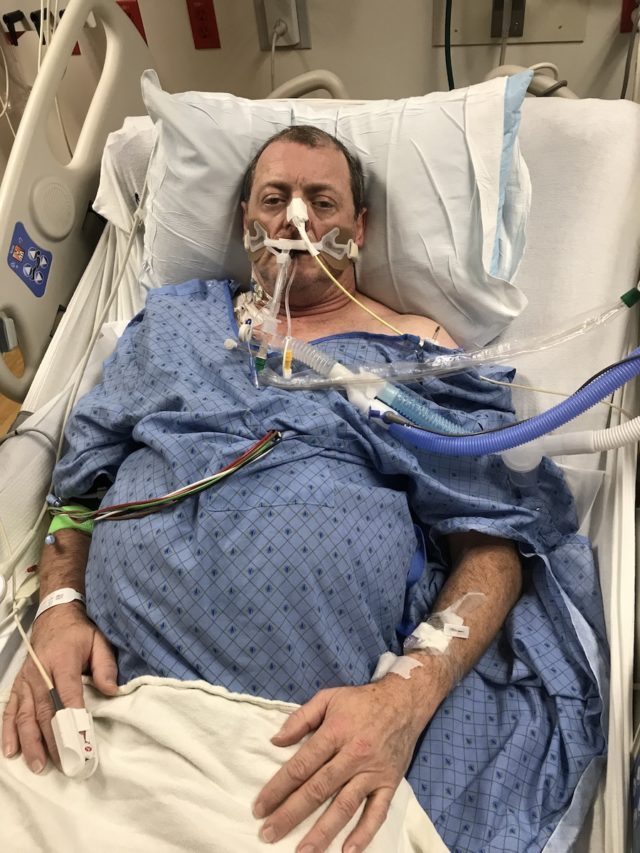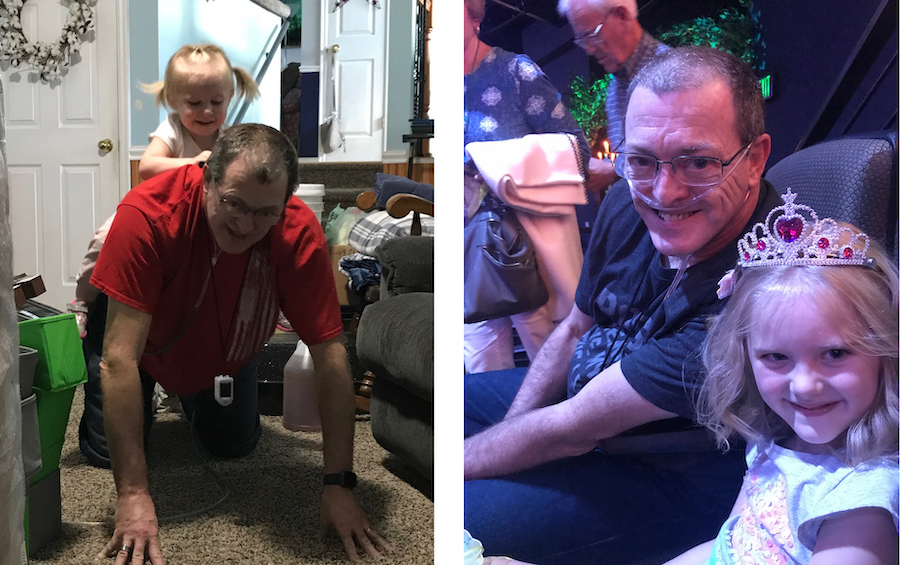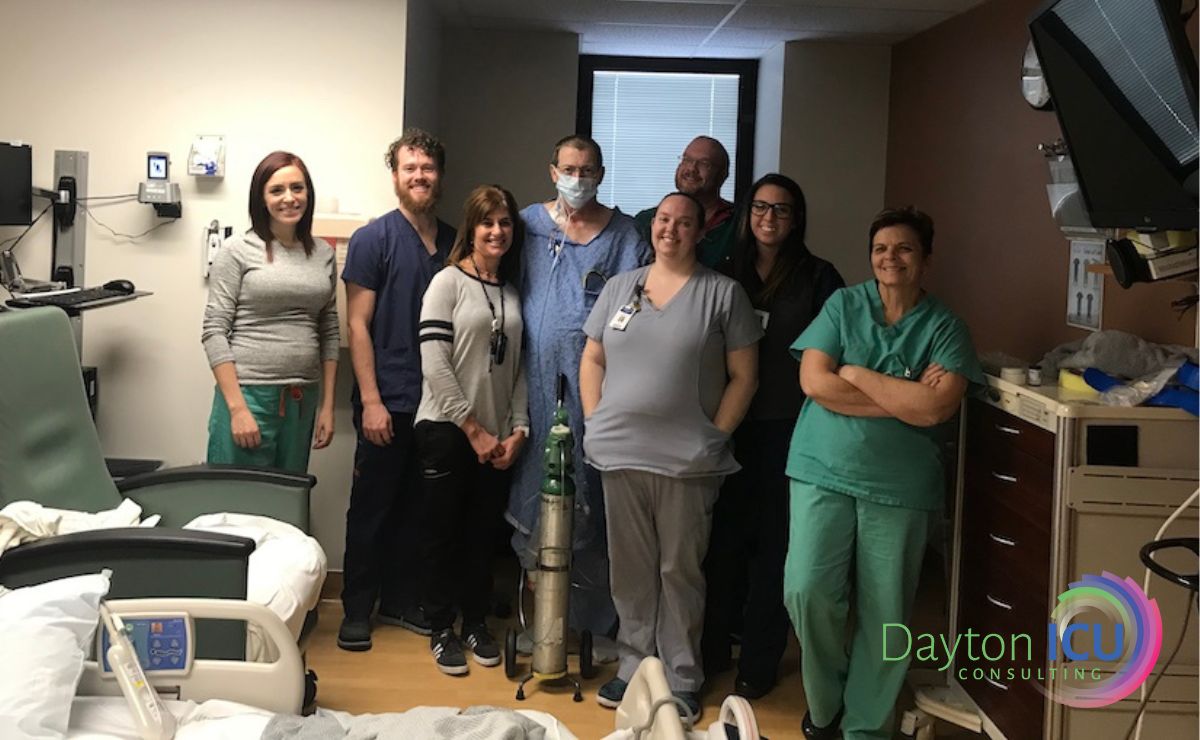Bryan Carter is a man with a history of type 1 diabetes who was admitted to the ICU for acute respiratory failure secondary to influenza A, which quickly developed into acute respiratory distress syndrome (ARDS).
He remained awake and walking while intubated on mechanical ventilation, even with high ventilator settings, including a PEEP of 18 and a FIO2 of 100%.
At some point, he became unable to oxygenate with movement, and required 48 hours of pronation, deep sedation, and paralytics.
Once he was able to tolerate lying on his back again, the nursing staff gave him a sedation vacation, in order to evaluate his ability to oxygenate with movement.
When it was realized that he could continue to oxygenate with movement, they determined that there was no longer any need for sedation.
Bryan was promptly put back on his feet, and allowed to walk again.
Moreover, despite having severe ARDS, he was able to be extubated after only 11 days on the ventilator.
Initially, Bryan was reluctant to get out of bed and walk around while on the ventilator, not least because he had originally requested sedation. However, luckily for Bryan, the ICU team that treated him helped him understand the risks involved with sedation and the opportunity he could have to survive and thrive if he continued to walk and help fight his ARDS.
In addition, there was a nurse who kept pestering him to get up and walk, which became quite annoying to Bryan, until one day he finally jumped up out of bed in frustration.
“It’s just phenomenal to me, looking back, that I was able to get up and walk around,” he said. “I really liked the fact that I could communicate and participate.”
In retrospect, Bryan said that despite all the annoyance, he knows this nurse was just trying to encourage him, and get him to do what was best for his health. He also said this nurse’s persistence could very well be the only reason why he ever agreed to ambulate while on the ventilator.
“I wouldn’t give up on myself because they weren’t giving up on me. And I think the walking on the ventilator and everything just tied into that,” he said.
At any rate, Bryan started off slow, at first only walking one lap around the nurses’ station per day.
But with time, Bryan started to walk further, to the point where shortly before he was discharged, he was actually able to walk about 1,000 feet at a time.
Needless to say, this is quite a feat for someone suffering from ARDS.
How Bryan’s Cognition Was Preserved by the ABCDEF Bundle

In addition to his tenacity and dedication to remaining mobile, before he was discharged, Bryan also had near-perfect cognitive abilities. This was likely as a result of the fact that, for the most part, he had remained awake and mobile while on the ventilator.
When the nursing staff had him complete a Montreal Cognitive Assessment, otherwise known as a MoCA test, which is a test used to detect cognitive impairments, he had near-perfect results.
This is pretty incredible considering ARDS survivors tend to have significant cognitive impairment when leaving the hospital, with some even suffering for years after being discharged.
One study showed that 70 to 100 percent of ARDS survivors have cognitive deficits when leaving the hospital.
But Bryan had an almost perfect score on his MoCA test before leaving the ICU, scoring a whopping 27 out of 30, which is a testament to the benefits of the evidence-based practices in the ABCDEF Bundle.
His team’s avoidance of unnecessary sedation spared him the damage of ICU delirium, which is probably why he never suffered from any sort of cognitive deficits.
That being said, shortly after taking the MoCA test, he was able to walk out of the ICU doors and was discharged directly home from the hospital.
If you want to learn more about Bryan’s story from the man himself, you can check out Episode 15 of my Walking Home From The ICU podcast.
What Bryan’s Life Looks Like Now

For nearly four decades, Bryan has worked in IT, and for a lot of those years, he’s been a network engineer, designing and building networks and data centers, with a focus on cybersecurity.
That being said, as a result of the evidence-based practices followed by the ICU team that treated him, Bryan was back to work less than two months after being discharged from the hospital.
He spent a year on home oxygen, but still, only six months after being discharged, Bryan was able to take on home renovation projects, and play with his granddaughter, in addition to going fishing and pheasant hunting. He was even able to hike about a mile on the way to the hunting grounds.
Bryan denies suffering from any symptoms of post-ICU syndrome, and is grateful to have been awake, present, mobile, autonomous, and communicative during his critical illness.
When I went to his office to interview him, Bryan said he feels being able to connect with and have support from his wife was absolutely essential to the positive outcome of his treatment.
“Like my wife said, it was good to be able to communicate with her and be able to make decisions together, instead of somebody making them for me,” he said.
“It gave me a lot of peace that she knew that I was okay with the things that were happening.”
Bryan also said he’s grateful to be an outlier in the ARDS survivor statistics and wouldn’t change a thing about the extraordinary care he received.
“I can specifically remember certain things that went on between me and the nursing staff that kept me feeling like I was going to be okay,” he said.
“It was a joint effort between them, and me, and my family, those that came to see me. We were all there together, and we were all trying to come up with what’s the best outcome. And when the best outcome came, everybody celebrated. You know, it wasn’t just me. They celebrated with me.”
Bryan’s outcomes are exceptional for an ARDS survivor because his ICU care was exceptional.
The Awake and Walking ICU team that treated him was able to effectively treat his ARDS while fighting to prevent other complications of critical illness.
Their use of the evidence-based practices found in the ABCDEF Bundle allowed them to ensure Bryan was awake and mobile, as much as possible, which spared him prolonged time on the ventilator, or having to deal with a tracheostomy, ICU-acquired weakness, ICU delirium, extensive rehabilitation, post-ICU PTSD, post-ICU dementia, and possible lifelong disability.
“I came away feeling like, when I left the hospital I had accomplished something,” he said. “And I had accomplished something not just because of me, but because of them. They had helped me accomplish this thing. And I’ll always be grateful for them, for everything they did.”
Do you want your ICU to be able to provide the same level of care that Bryan received? We can walk you through the entire process, so please don’t hesitate to contact us.



